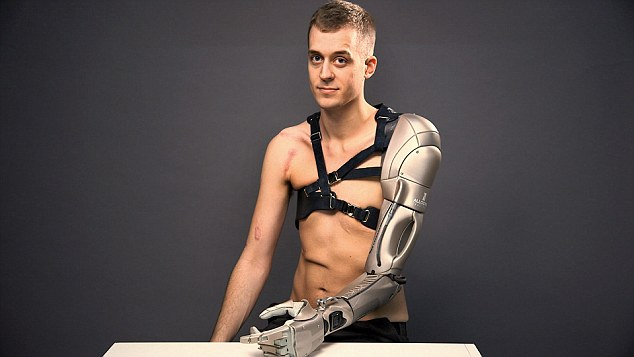Body augmentation and transhumanism: the future of prosthetics
- 21.06.2018
- EmmaArnold
- None
We recently wrote about modern prosthetic technology, but here we will consider how this is being explored outside of the realms of treating and improving the quality of life of amputee patients.
Humans have been tweaking their bodies for millennia. A simple piercing or tattoo both qualify as body augmentation, but it is increasingly possible for humans to take this notion further and merge their bodies with technology, such as prosthetics, to evolve beyond their current capabilities.
For instance, with specially designed prosthetics, it could be possible to be stronger and faster than others. The result is an iteration of Homo sapiens enhanced or augmented, but still human.

James Young
Double amputee and filmmaker, James Young, sheds light on the reality of the matter:
The abilities of myoelectric limbs already exceeds human capabilities in certain ways. The ability to maintain grip indefinitely or withstand temperatures that would denature skin proteins, burn and cause pain. Wrist rotators allow the rotation of objects held in the hand by 360° and beyond.
But everything that exceeds human ability in some way has drawbacks in another - these hands are unable to repair themselves by growth and cellular activity. Broken bones can re-join and heal, but broken carbon fibre has none of these properties.
This concept is called Transhumanism and it has a significant following around the world. Coined by Max More, the CEO of Alcor Life Extension Foundation in 1990, Transhumanism on paper is an attractive concept. With the right technology, who wouldn’t want to be faster, stronger and effectively functioning beyond the limitations of their own bodies?
In some cases, by removing frail biological limbs and replacing them with sturdier, more capable prosthetic limbs.
Ethical considerations
Transhumanism raises numerous ethical concerns. On the one hand, it makes sense to take advantage of technologies our society creates in order to improve humanity and make people stronger, faster and smarter. But facilitating these changes as a society opens interesting ethical questions. Depending on how far they take it, would people cease to be human? A person enhanced with technology would have key parts of their body replaced with technology that is by definition, not natural.
As alluded to in science fiction literature and in video games such as Deus Ex, would augmented humans be discriminated against? Would transhumanism cause segregation between non-augmented humans? Or would it create a two-tiered society where only the rich and powerful gain access to the technology to augment themselves, leaving the poor behind?
These are challenging questions that nobody has an answer to just yet, Dr Kianoush Nazarpour, reader in biomedical engineering at Newcastle University, thinks this is all a long way off yet. He said: “In my research, I’m not particularly interested in augmenting function, as restoring function is far more important in my opinion.
However, the hype is out there, many colleagues and peers do talk about quite far-out concepts such as obtaining a third hand as easily as getting a nose job. But I think we’re so far away from that concept right now, because the technology really isn’t quite there.
Next in the series
Despite these continual advancements, there are a number of barriers blocking the widespread adoption of the latest prosthetic technologies, which we will be looking at in detail next week.
Remember to keep an eye on the blog and our social media channels to find out more about amputee disability and prosthetics over coming weeks.
